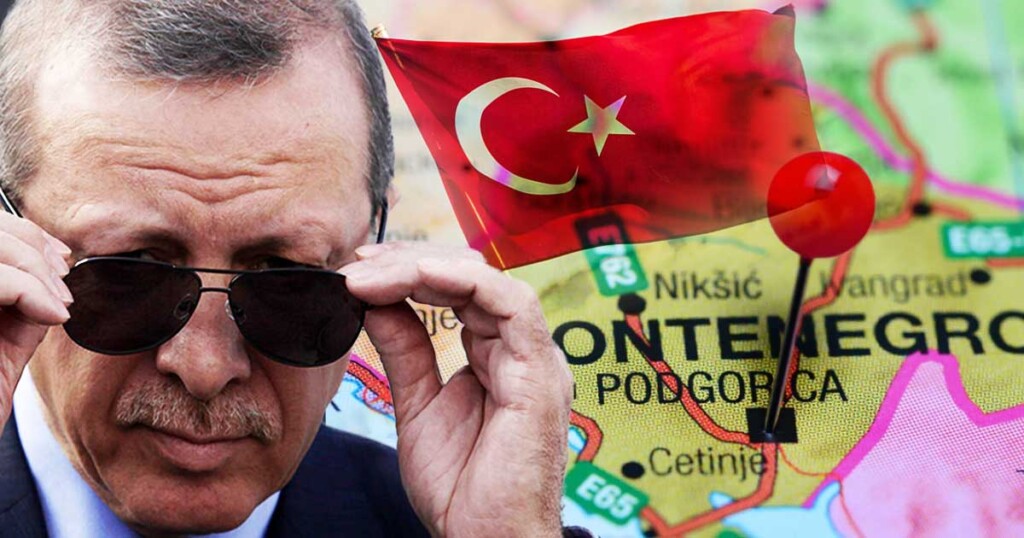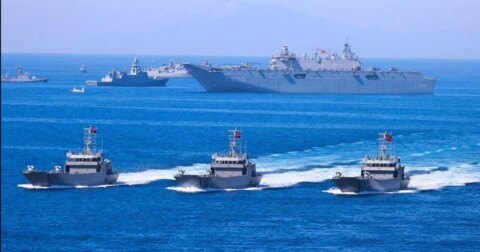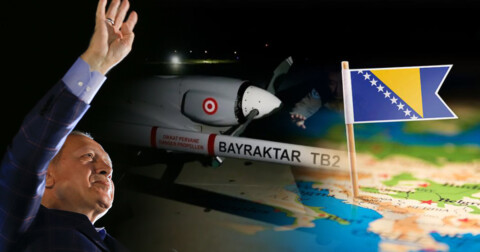In one of the previous articles, I already pointed out that in the contemporary Turkish neo-Ottoman foreign policy doctrine of “strategic depth,” according to our most renowned Orientalist Darko Tanasković, the Balkans are marked as one of three priority strategic regions (along with the Caucasus and the Middle East) that were historically part of the Ottoman Empire. This is also confirmed by the director of the Ljubljana-based International Institute for Middle Eastern and Balkan Studies (IFIMES), Aljaž Bahhtijar, who emphasizes that “Turkey, as the successor of the Ottoman Empire, bears a moral responsibility to assist the Balkan countries”.
PARADISE FOR LAUNDERING SUSPICIOUS MONEY
Among the Balkan countries, Montenegro appears to hold special significance for Turkey. Several factors contribute to Montenegro acquiring the role, in the plans of official Ankara, of a kind of beachhead for implementing the neo-Ottoman doctrine of “strategic depth” in the heart of the Balkans. In short, these are:
- A favorable traffic-geographical position of the Adriatic, i.e. Mediterranean coastal state, which borders an EU member, as well as most Balkan countries (except North Macedonia and Bulgaria) where Muslims constitute either a majority population or a significant minority;
- A significant share of the Muslim population within Montenegro itself (19.99% or 124,668 according to the 2023 census); moreover, the Muslim population in Montenegro is predominantly compactly settled in the southeast, east, and north of the country—primarily along the border with Albania, which, as a “seismograph of Balkan movements,” holds priority in the Balkans for Turkey according to the creator of the “strategic depth” doctrine, Ahmet Davutoğlu (primarily due to the reduction and rejection of Greek and Italian influence, D. Tanasković, Neo-Ottomanism: Doctrine and Foreign Policy Practice, Belgrade, 2010);
- Montenegro and Turkey’s joint membership in the NATO alliance;
- Their shared commitment to European Union membership;
- A favorable investment environment (the lowest corporate income tax rate in the region at 9% and minimal administrative barriers for foreign investment);
- The absence of an institutional mechanism ensuring the screening and transparency of foreign investments, and the associated international image of Montenegro as a “paradise” for the investment of suspicious capital and “money laundering”.
UNQUESTIONABLE PRAGMATISM OF TURKEY’S FOREIGN POLICY
To understand Turkey’s comprehensive activity in Montenegro over the past 5–6 years, the following insight by Orientalist Darko Tanasković is particularly significant: “In implementing a foreign policy based on the principles of the doctrine of ‘strategic depth,’ which entered an intensive phase at the end of the first decade of the 21st century, Turkey seeks to utilize all the comparative advantages of its geostrategic position, economic strength, military power, and polyvalent civilizational identity.” It must also be noted that the neo-Ottoman foreign policy of modern Turkey is characterized, in Tanasković’s words, by “unquestionable pragmatism.”
Consequently, Turkey operates in Montenegro on multiple, distinct yet interconnected fronts, using both its own comparative advantages and those of Montenegro—though interpreted through the lens of the regional Balkan dimension of neo-Ottomanism.
The beginnings of close foreign policy cooperation between Turkey and Montenegro date back to the proclamation of Montenegrin independence in 2006. Specifically, Turkey was the seventh country to recognize Montenegro’s independence, doing so on June 12. That Turkey and Montenegro maintain very close foreign relations is also evident from the fact that Montenegro is the only country to have signed an agreement with Turkey on diplomatic and consular assistance. According to that agreement, Turkish diplomatic and consular missions in 25 countries provide assistance to Montenegrin citizens, as Montenegro has no diplomatic-consular representation in those countries. This Agreement was signed after the fall of Đukanović’s regime, in August 2021.
CORONAVIRUS DIPLOMACY
It is interesting that President Erdoğan’s first visit to Montenegro occurred after the “litije” (religious processions) movement and the opposition’s victory in the parliamentary elections in August 2020. Although he visited Montenegro at the invitation of the then head of state Milo Đukanović, Recep Tayyip Erdoğan met not only with the President of Montenegro on August 28, 2021, but also with the new Prime Minister Zdravko Krivokapić and the President of the National Assembly, Aleksa Bečić. A separate meeting was also arranged between the Turkish President and members of the Bosniak Party in the Montenegrin Parliament, led by the party’s leader Ervin Ibrahimović.
The intensification of interstate cooperation between Montenegro and Turkey coincided with the period of the COVID-19 pandemic. Turkey used the pandemic to further expand its influence in numerous countries through so-called coronavirus diplomacy, which primarily involved providing significant humanitarian aid to certain states. Consequently, during that time, Turkey donated as many as 100,000 Chinese Sinovac vaccines to Montenegro.
TURKEY – THE LARGEST DONOR TO THE MONTENEGRIN ARMY
That the new authorities in Montenegro have managed to establish very close foreign policy relations with official Ankara—and that Montenegrin-Turkish cooperation in various fields has intensified in the meantime—was confirmed by the President of Montenegro, Jakov Milatović, during his visit to Erdoğan on December 2, 2024.
“Today, Turkey is an important NATO ally and a partner of Montenegro,” Milatović stated on that occasion, adding that Turkey is one of “the most important economic and strategic partners of Montenegro, with great development potential.”
During his visit to Turkey, Milatović expressed hope that in 2025 an agreement on partnership would be signed between the two countries, along with the establishment of a joint council to coordinate mutual cooperation.
Military cooperation between Montenegro and Turkey is based on the Framework Agreement on Cooperation in Military Fields of Training, Technology, and Science from 2014, the Agreement on Cooperation in the Field of the Defense Industry from 2017, and especially on the Agreement on Military-Financial Cooperation between the two states from 2019. Under this latest Agreement, Turkey committed to gradually allocate €15 million to Montenegro between 2020 and 2024 for the modernization of the Armed Forces, “in accordance with NATO standards.” This primarily refers to the procurement of weapons and equipment produced by Turkey’s defense industry. In addition to the 2019 Agreement, an Additional Protocol was signed on Turkey’s financial assistance worth €500,000 for the modernization of Armed Forces training in Montenegro, which primarily included the education of Montenegrin cadets in Turkey. Thus, Turkey became the single largest donor to the Montenegrin Army. For comparison, the budget of Montenegro’s Ministry of Defense for the year 2020 was approximately €50 million.
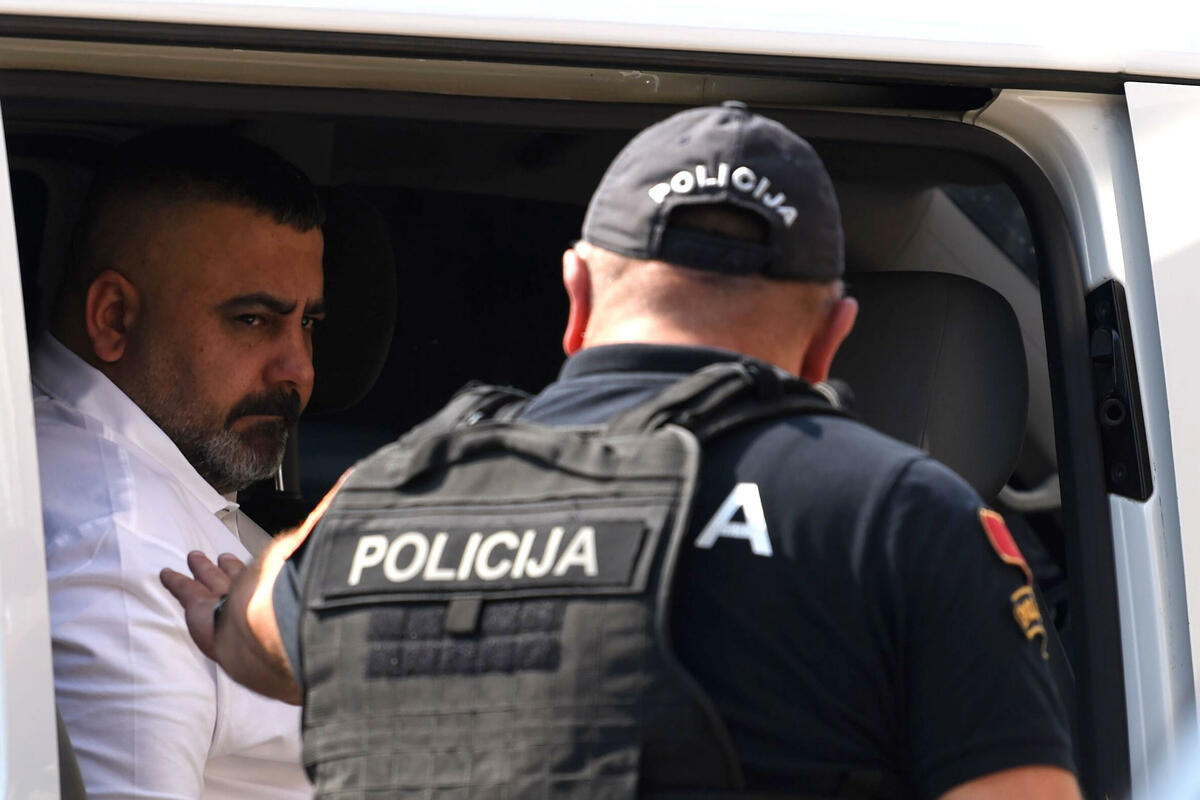
THE CASE OF BINALI ÇAMGOZ
The trend of increasingly intensive and closer cooperation between official Podgorica and official Ankara could also be observed in recent years through the well-known case of Binali Çamgoz. He is a Turkish citizen, a Shiite Muslim, and a member of the Kurdish ethnic community, who opened a company in Budva in 2022. Turkey had been requesting his extradition from Montenegro through Interpol since his initial arrest in that same year, 2022. A criminal proceeding was initiated against him in Turkey for some of the most serious offenses, such as organizing an international criminal group and attempting to assassinate the mayor of a district in Izmir affiliated with Erdoğan’s party. In Montenegro, his name was linked with members of the “Škaljari” clan. Reportedly, Binali Çamgoz’s son died in a Turkish prison, allegedly due to injuries inflicted by prison guards. Justice Ministers Kovač and Milović had refused Çamgoz’s extradition to Turkey, citing his medical condition (he had been a paraplegic for many years) and the absence of guarantees for a fair trial in Turkey. However, following the latest reconstruction of Spajić’s Government, Binali Çamgoz was extradited to Turkey on August 29, 2024.
GROWTH OF DIRECT INVESTMENTS
Since 2010, Montenegro has had a Free Trade Agreement with Turkey, which was revised in 2019 with an additional Protocol. The intensity of economic cooperation between the two countries, particularly after 2020, is convincingly demonstrated by the fact that in 2024, Turkey—with €99.6 million—became the third-largest country in terms of direct foreign investment in Montenegro, right after Serbia (€118.2 million) and Russia (€100.2 million). The sharp increase in Turkish investment in Montenegro’s economy is illustrated by the fact that in 2019, Turkish direct investments amounted to only €34.46 million.
According to data from July 2024, a total of 9,500 companies (compared to 6,000 the previous year) founded by Turkish businesses and entrepreneurs were operating in Montenegro, accounting for one-fourth of all foreign-owned companies in the country. Most of them are registered in Budva and Podgorica, but there are also those based in Kotor, Nikšić, and Bar. Turkish companies are primarily present in the construction, tourism, and mining sectors. The largest Turkish companies in Montenegro include: Turkish Airlines, Ziraat Bank, Net Montenegro, Zeren Group, and Zeta Mine. The Turkish Ambassador to Montenegro announced last year the construction of an industrial zone–technopark as one of the largest Turkish investments in the country.
According to Prime Minister Spajić, “there is tremendous potential for further economic cooperation with Turkey, especially in the areas of tourism, energy, healthcare, education, transportation, and agriculture”.
MORE COMPANIES – MORE CITIZENS
The increase in the number of Turkish companies is directly linked to the rise in the number of Turkish nationals with permanent residence in Montenegro, which aligns with the general trend of a growing foreign population in this Balkan country. According to the 2023 population census, 46,878 persons with foreign citizenship reside in Montenegro, including 1,816 Turkish nationals, who mainly live in Podgorica and Budva.
There is also a noticeable rise in the share of Turkish tourists within the overall number of overnight stays by foreign visitors in Montenegro. In 2019, Turkish tourists accounted for only 0.9% of total foreign tourist overnights, whereas in 2024, their share rose to 5.2%. Based on this measure, Turkish tourists ranked fourth among all foreign tourists in Montenegro, right after tourists from Serbia (25.4%), Russia (24.9%), and Bosnia and Herzegovina (9.7%).
With the aim of gathering Turkish companies operating in Montenegro, the Turkish Chamber of Commerce (TurCham) was opened in 2023. The importance of this event—and of Turkey’s place in Montenegro’s economic landscape—is underscored by the fact that the opening ceremony of the Turkish Chamber of Commerce office in Podgorica was attended by then Prime Minister Abazović and Turkish Foreign Minister Fidan.
POPULARIZATION OF THE TURKISH LANGUAGE
A special role in the interstate cooperation between Montenegro and Turkey is played by the Turkish Cooperation and Coordination Agency (TIKA), which, since opening its office in Podgorica in 2007, has implemented around 500 development projects worth over €20 million, across numerous Montenegrin municipalities—especially in the north—primarily in the fields of transport and administrative infrastructure, agriculture, healthcare, education, and culture.
As part of its neo-Ottoman foreign policy, Turkey uses “education and culture as instruments of influence” in the Balkans, taking into account the shared cultural heritage. According to Russian Orientalist Irina Svistunova, TIKA plays a leading role among the many Turkish state structures tasked with “promoting Turkish culture in the Balkans and strengthening ties with ethno-confessional minorities”.
The popularization of the Turkish language and culture in the Balkans, according to Svistunova, is also carried out through the Yunus Emre Institute network, which opened an office in Podgorica back in 2014. According to data shared by the Turkish Ambassador to Montenegro in October last year, over 450 Montenegrin citizens have completed university studies in Turkey with the help of Turkish state scholarships. In addition, starting from 2024, the Turkish language can be chosen as an elective subject in all schools across the territory of Montenegro.
BOSNIAK AND ISLAMIC FACTOR
Numerous facts indicate that a special role in Montenegrin-Turkish interstate cooperation has been given to members of the Bosniak Party. Its members in Dritan Abazović’s government, as well as in Milojko Spajić’s government—following its reconstruction and the entry of the Bosniak Party into the government in July 2024—have used every opportunity to highlight the close ties between the Bosniak Party and Recep Tayyip Erdoğan’s Justice and Development Party (AKP), as well as the strong relations between the two states.
For instance, on May 7, 2023, at an election rally of Erdoğan’s Justice and Development Party (AKP) at Atatürk Airport in Istanbul, high-ranking members of the Bosniak Party who also held senior Montenegrin state positions were present: then Minister of Labor and Social Welfare Admir Adrović and State Secretary in the Ministry of Defense Asmir Pepić. They were accompanied by Enes Husović, the son of the founder of the Bosniak Party, Rafet Husović, who died in 2021 and whom Erdoğan described in a condolence message as a “brother” and a “leader of the Bosniak community in Montenegro”. Husović’s successor as leader of the Bosniak Party, and at that moment Deputy Prime Minister of Montenegro and Minister of Capital Investments, Ervin Ibrahimović, participated on May 12, 2023—two days before the Turkish elections—in a major event led by Recep Tayyip Erdoğan: the opening of a new mosque in Istanbul named after the famous commander of the Ottoman navy, Kapudan Pasha (Admiral) Hayreddin Barbarossa. At that time, Ibrahimović told Turkish media that “Bosniaks from Montenegro support Erdoğan.”
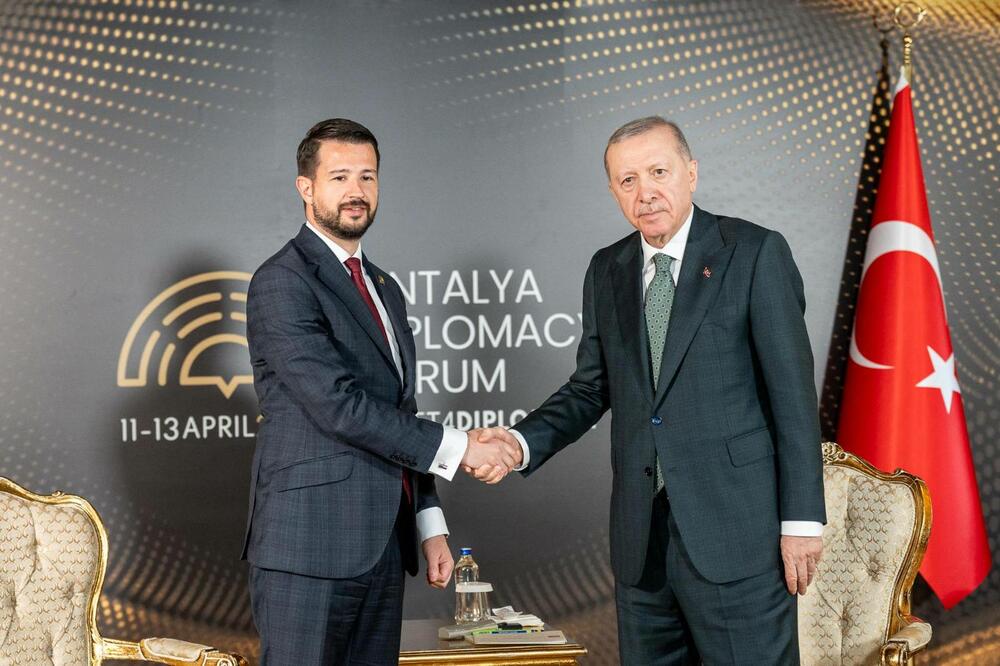
ERDOĞAN CONGRATULATORY MESSAGE
As part of his visit to Turkey, Ibrahimović also participated in a meeting organized by the Speaker of the Turkish Parliament with official representatives of various Balkan peoples considered close to Turkey. In addition, Ibrahimović was a guest at a ceremonial dinner hosted by Bosniak associations in Turkey.
In his congratulatory message to Erdoğan on his election victory on May 28, 2023, Ibrahimović emphasized, among other things: “The Bosniaks in Montenegro, all the citizens of Montenegro, and the state of Montenegro have always had—and will continue to have—a reliable and sincere ally in Turkey, but this alliance, with you as President, gains additional stability and intensity”.
The closeness between the Bosniak Party and Erdoğan’s Justice and Development Party is further evidenced by the congratulatory message from Turkish Foreign Minister Hakan Fidan—one of Erdoğan’s closest associates—to the Bosniak Party on its election results achieved in the June 2023 elections, as well as Fidan’s support and congratulatory message to Ibrahimović following his decision to join Spajić’s Government.
TWO FACTORS ACCORDING TO IBRAHIMOVIĆ
It is interesting to note that the splinter faction of the Bosniak Party—which opposed the party’s entry into Spajić’s Government (labeled as “Andrija Mandić’s Government” and described as a “blend of populism and nationalism,” here)—and subsequently formed the Bosniak Democratic Movement in August of last year, established its first contacts in Turkey with certain representatives of the Montenegrin diaspora and local officials from the “Kemalist” Republican People’s Party (CHP) who are of Montenegrin origin.
A clear indication that officials of the Bosniak Party will always use their position in the Government of Montenegro—regardless of its party composition—to promote and intensify cooperation between Montenegro and Turkey was provided by Bosniak Party president Ervin Ibrahimović in August 2023. Namely, the first country he chose to visit after assuming the position of Deputy Prime Minister in Spajić’s Government and the new Minister of Foreign Affairs of Montenegro was precisely Turkey. During talks with his host, Turkish Foreign Minister Fidan, Ibrahimović specifically pointed to two factors that make current Montenegro–Turkey relations exceptionally close: Turkey is a “NATO ally” of Montenegro, and there are “many people of Montenegrin origin living in Turkey today who are loyal to Turkey but have a strong emotional connection to Montenegro”. Interestingly, these same two factors were also highlighted by President of Montenegro Jakov Milatović during his visit to Erdoğan on December 2, 2024, as key elements contributing to the development of interstate relations between Montenegro and Turkey.
FAMILY TIES
Russian Orientalist Irina Svistunova points out that Turkey’s relations with Balkan states are influenced not only by the Turkish national community and Muslim religious communities within certain Balkan countries but also by the communities of Balkan migrants living within Turkey itself. Some Turkish demographers estimate that as much as 20% of Turkey’s population has close or distant familial ties to the Balkans. Balkan migrants form large and influential communities in Istanbul, Bursa, Izmir, and Izmit.
The diaspora of Montenegrin Muslims in Turkey is estimated to number around 100,000 people, while some estimates go as high as 250,000. It is mostly composed of migrants from northern Montenegro, but also from the areas of today’s municipalities of Podgorica, Nikšić, Bar, and Ulcinj. These individuals migrated to Turkey mostly after the First Balkan War, World War I, World War II, and during the early 1990s. Emigrants from Montenegro founded the “Association for Social Solidarity and Culture of Yugoslav-Montenegrin Emigrants” in 2013, which has since been renamed “Montenegro-Karadag Association.” In addition to this association, according to Montenegro’s Directorate for Diaspora, the Montenegrin diaspora in Turkey is also organized through several other associations: “Bosnia, Sandžak” in Istanbul, an association of the same name in Izmir, the “Association of Emigrants from Montenegro” in Adana, the “Modern Sandžaklije” association in Istanbul, and several others.

THE BALKANS – A HOME FOR THE TURKS
In accordance with the multidimensional nature of neo-Ottomanism—as the foreign policy doctrine of Erdoğan’s Turkey—which, in the words of D. Tanasković, represents “an ideological amalgam of Islamism, Turkism, and Ottoman imperialism,” it is important to distinguish Bosniak identity as an ethnic factor from Islam as a religious factor among the elements influencing the development of overall relations between Montenegro and Turkey. This is especially relevant because, in Montenegro, the Islamic community (124,668) is broader than the Bosniak ethnic community (58,956), as it also includes a significant Albanian minority (30,978).
How Erdoğan’s Turkey views the Balkans—and by extension Montenegro—through the lens of Islam as an important component of neo-Ottomanism can be seen in a highly indicative message from Erdoğan’s former spokesperson and foreign policy adviser, İbrahim Kalın, who since 2023 has been serving as the director of Turkey’s National Intelligence Organization (MIT). In a 2018 statement to Daily Sabah, Kalın declared: “Since the time the Balkans became part of the great Muslim world, Turks have regarded this region as their home”.
The extent to which modern Turkey assigns importance to the Islamic factor in the Balkans is also evident in the state-sponsored project Islam in the Balkans—a bilingual (Turkish and English) five-volume publication released by the TIKA agency in 2016, which includes articles by prominent authors from Turkey and various Balkan countries.
ERDOĞAN AWARDED THE HUSEIN PASHA BOLJANIĆ HONOR
The Islamic component of Turkey’s cooperation with Montenegro was symbolically emphasized during Erdoğan’s first visit to Montenegro, when the Islamic Community of Montenegro awarded him its highest distinction—named after Husein Pasha Boljanić, a high-ranking Ottoman statesman (16th century) from Boljanići near Pljevlja. He held senior administrative positions ranging from Herzegovina and Bosnia to Asia Minor and Egypt, and he built the well-known Husein Pasha Mosque in Pljevlja.
In addition, the Turkish state agency TIKA has financed the construction or restoration of numerous mosques across Montenegro—in Bar, Rožaje, Podgorica, Karabuško Polje near Podgorica, Bioče near Bijelo Polje, Ulcinj. Among the Islamic religious structures erected in Montenegro thanks to financial support from the Turkish state, a special place belongs to the Islamic Cultural Center and the Selimiye Mosque in Bar, which, with approximately 4,000 square meters, is one of the largest complexes of its kind in the Balkans. This complex was inaugurated in 2014 by the then Deputy Prime Minister of Turkey, in the presence of Montenegro’s highest-ranking officials. Interestingly, it was in Bar that Adem Mustafić served as an imam for ten years. In 2016, he was killed in Syria while fighting in the ranks of the Islamic State of Iraq and the Levant (ISIL).
IN THE EYES OF THE MODERN TURK, THE BALKANS ARE RUMELIA
When analyzing Turkey’s increasingly active presence in the broader Serbian national space—which also includes Montenegro—it is important to consider the following recommendations by our most renowned Orientalist and seasoned diplomat, Darko Tanasković:
“Turkey is a state of objectively significant strength and importance, especially on a regional scale, such that without its participation and constructive cooperation, lasting stability and development in the Balkans cannot be achieved—particularly in the broadly understood economic sphere, but also in the political one. However, in order to ensure the equal realization of their own national and state interests, Turkey’s partners in the Balkans must adequately and consistently take into account the neo-Ottoman nature of the motives and goals behind Turkey’s pronounced engagement in the region—which, in the eyes of many modern Turks, is still, above all, Rumelia.”
(D. Tanasković, Neo-Ottomanism: Doctrine and Foreign Policy Practice)
